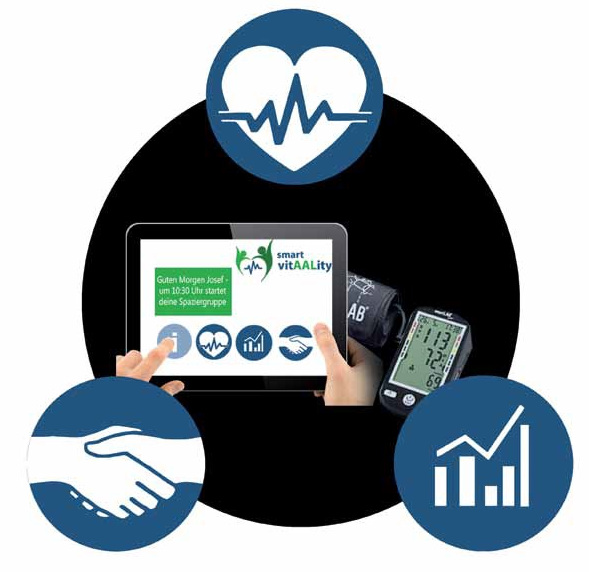SMART VITAALITY - Ageing with Smart Quality of Life
Short Description
The overall desire for a high subjective quality of life and independence is one of the key common denominators concerning the needs of the older generation - despite the great diversity in this target group. New technologies are increasingly opening up new opportunities to shape our everyday life, and especially to support the quality of life and independence of elderly people.
Correspondingly broad marketing success has not yet been achieved and associated financial models for such AAL technologies are still lacking and depend on a range of mutually influencing factors such as usability, functionality, acceptance, impact and, last but not least, financial feasibility.
Integrated AAL System in a Smart City Environment
The SMART VITAALITY project involves the long-term testing of an integrated AAL system in one hundred senior households in the smart city environment “Health, Inclusion and Assisted Living”. The SMART VITAALITY system offers future users utility-based, expandable, modular and intuitive user-friendly services that can be readily integrated in existing everyday processes. These functionalities are designed to maintain quality of life in terms of well-being, health and social inclusion on a long-term basis.
This should allow seniors to live longer, independently and more contentedly in their own home environments. SMART VITAALITY has been developed in a consistent user-centred approach, integrating a range of functionalities developed together with the target group, including health management (telemonitoring including servicing through an integrated medical care centre, alarm function), lifestyle monitoring (objective recording of ADL parameters, support in the active organisation of everyday life) and social inclusion and community services (serviced provision of information, networking inside the target group and participation support).
The SMART VITAALITY components should not be seen as purely technological solutions, but will be offered in close cooperation with members of the medical profession, associations and communities. A tablet (interface and control for all functions, video telephony) and a smartwatch (pulse measurement, recording of physical activities, alarm function) are integrated into the system as user interfaces.
Demonstration and Evaluation
The SMART VITAALITY system will be evaluated in one hundred senior households in the Carinthian urban triangle of Klagenfurt–Ferlach–Villach over the course of one year. This serves to assess the influences on subjective quality of life, individual benefits and potential obstacles in dealing with new technologies and to carry out a socio-economic analysis based on the results. In addition to acceptance and usability evaluations, the model also includes controlled impact analysis of subjective quality of life and subsequent socioeconomic potential analysis.
The results of the study should form a substantiated basis for transforming individual components and services into a (regular) funding model, as an important part of a sustainability strategy. The combination of urban settlements containing 10,000 to 100,000 inhabitants – a small town (Ferlach), a medium-sized city (Villach) and a large city (Klagenfurt) – is representative of the Austrian urban landscape and offers additional possibilities for comparison between different urban environments.
Introducing New Technologies and Putting Them to Sustainable Use
SMART VITAALITY aims to provide sustainable evidence of effectiveness and cost efficiency of both the overall system and its single components. It is clearly based on an established, demand-oriented theory, and is not purely technologydriven. Its main goal is to maintain quality of life on a long-term basis.
This goal is embedded and reflected actively in a socio-economic context. A further goal of test and pilot regions is to implement “educative” and useful applications of AAL. The SMART VITAALITY project gives seniors and AAL-relevant stakeholder groups (quadruple helix) an insight into the technology used. Potential and actual challenges should be explained and communicated in an easy-to-understand manner in order to build and strengthen awareness of this topic.
The project is also expected to stimulate the AAL research and marketing environment and interdisciplinary geriatric and gerontology research, both at regional and transregional level.
Project Partners
Consortium Manager
Carinthia University of Applied Sciences
Further Project Partners
- Hilfswerk Kärnten Service GmbH
- ilogs mobile software GmbH
- JOANNEUM RESEARCH
- Forschungsgesellschaft m. b. H.
- MedCubes GmbH
Contact Address
Project Coordinator
Dr Johannes Oberzaucher
E-mail: j.oberzaucher@fh-kaernten.at

